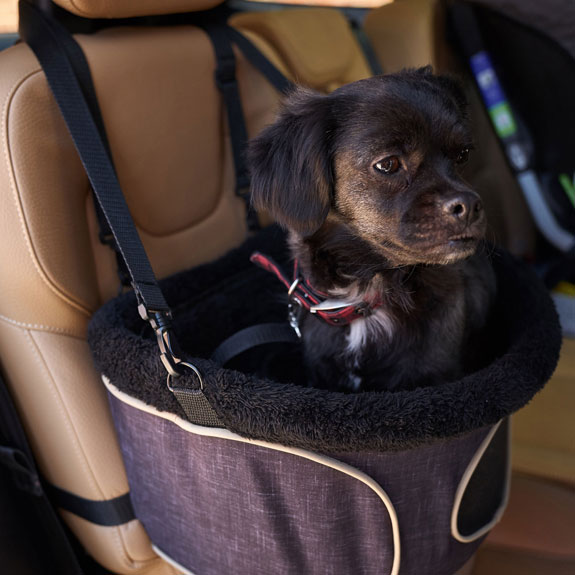Car Sickness In Dogs: Causes, Symptoms, & Treatments

Car rides are an activity that the whole family, including our dogs, can enjoy. Whether you're taking a scenic drive up the coast or simply driving across town to run some errands, many pet parents enjoy bringing their dogs along for the ride. But for those who suffer from motion sickness, car rides are anything but pleasant, dogs included. Veterinarians can't exactly pinpoint why some dogs get car sick while others don't. However, this article will explore some possible reasons why your dog gets woozy in the car, how to treat or prevent it, and more.
WHY DOES MY DOG GET CAR SICK?
- Anatomy: Just like how children are affected by motion sickness more than adults, so are puppies. The anatomy of the ear structure, particularly the inner ear involved in balance, are not yet fully developed in puppies. Some dogs outgrow motion sickness of this nature, while others, unfortunately, don't.
- Conflicting Sensory Signals: Another cause for motion sickness is how conflicting sensory signals are sent to the brain's emetic, or vomiting, center. In other words, the inner ear signals from the vestibular system conflict with signals from the eyes, and this mismatch results in nausea and vomiting.
- Fear, Anxiety, Stress: Behavioral issues can also trigger motion sickness in dogs. Your dog may even have a previous traumatic experience related to car rides that may be contributing to his negative perception of the car, especially if your dog knows you are on the way to the vet.
- Age: As mentioned previously, puppies seem to be more susceptible to motion sickness than adult dogs. The good news is that motion sickness in puppies usually resolves with age.
MOTION SICKNESS SYMPTOMS:
Observe if your dog shows these symptoms every time you take road trips.
- Severe drooling
- Whining
- Yawning
- Vomiting
- Restlessness, trembling, or shaking
- Excessive panting
It's important to note here that some dogs show no symptoms of car sickness at all.
HOW DO I TREAT MY DOG FOR MOTION SICKNESS?
1. Desensitization: If motion sickness is fear or anxiety based, a desensitization program or training may help. This program involves gradually introducing stronger stimuli to a dog until he becomes accustomed to its full effect. Help your dog get used to the car and alleviate any car-related anxieties by putting him in the car with your for a few minutes each day. Don't turn the car on or drive anywhere, at first. As your dog gets used to the car, gradually start the car and go somewhere close by or simply take a short drive around the block. Bring a toy, their favorite blanket, or anything comforting that'll help him calm down and make the car feel more familiar.
Do this until he shows more enthusiasm or comfort in relation to the car. The trick here is to progress slowly during the first few days. Every time he does not get sick, increase the amount of travel he takes. If he does get sick, then move the process backwards until he is not ill again. Show your dog that car rides can be enjoyable and trouble-free. Make sure he associates car rides with positive things, like a hike or visiting a dog park.
2. Natural Remedies: Natural remedies are the easiest to get ahold of. However, always consult a vet beforehand. Your dog may have allergies or sensitivities to some natural remedies that can cause effects in dogs with comorbidities, such as bleeding disorders, or in dogs taking anticoagulants or nonsteroidal anti-inflammatory drugs (NSAIDs).
3. Calming Supplements: You can give your dog calming oral supplements like Solliquin, Composure, or Rescue Remedy to calm them during car rides. Some may need to be taken daily for a few days or even a few weeks for maximum benefit. These products are generally safe for most dogs since they have few adverse side effects. As always, consult your vet before administering any supplements.
MOTION SICKNESS MEDICATIONS FOR DOGS
As a last resort, your vet can recommend medications.
- Benadryl/Dramamine: There are over-the-counter options they may be used for motion sickness in dogs. Both products have antihistamines that may have sedative effects can be administered every 8 hours. If your dog take Dramamine with food, they may better tolerate it. Benadryl, however, can cause potential gastrointestinal side effects such as vomiting, diarrhea, and decreased appetite.
- Anti-anxiety Medication: Anxiety in the car can cause motion sickness, so anti-anxiety medications may be necessary for extreme cases, along with behavior modification.
PREVENTING MOTION SICKNESS IN DOGS

- Ensure your dog can look out the window: As dog motion sickness is often worse for dogs who sick in the back of your car, have your dog sit in front while looking out the front window. It can help equalize pressure and minimize adverse effects on your dog's vestibular system.
- Use a car restraint: A dog car seat like the Snuggle Pocket pictured above, a harness with a seat belt, or a travel crate are all good ideas if your dog suffers from car sickness. These products lower the risk that sudden movements or a sudden change in position may trigger nausea.
- Avoid car rides on a full stomach or immediately after meals: A full stomach can aggravate motion sickness and make your dog more likely to vomit, so you might want to try adjusting your dog's feeding schedule before a car ride. According to a Maryland-based vet Dr. Mark Olcott, "Avoid large meals and feed them two hours before leaving so that all the food is digested and out of the stomach before you leave."
CONCLUSION
Bringing our dogs along for the ride is always fun for the entire family. However, when dog's get car sick, it can no longer be enjoyable. Puppies are known to experience more car sickness than older dogs because their inner ears are not yet fully developed. However, as your puppy grows the chances your car sickness lowers. Yet, some dogs never grow out of getting car sick. To help reduce motion sickness in older dogs, there are anxiety medications, over-the-counter medications, and calming supplements. As always, consult your vet before introducing any new medications to your dog.
Previous article

Next article

Related posts
View all-

5 Simple Tips to Make Sure Your Cat Drinks Enough Water
Ensuring your cat stays hydrated is important, but it can be challenging since many cats don't drink enough water. Dehydration can lead to kidney disease and other health issues. Fortunately, you can encourage your cat to drink more with a few simple changes. Read Article -

How to Keep Your Cat Busy at Night (So You Can Sleep)
For many cat owners, the quest for a good night's sleep while keeping their feline friends content and engaged can seem like a never-ending battle. Cats, naturally more active at night or early in the morning, often disrupt your sleep schedules with nocturnal activity, whether through playful nature or seeking attention. Read Article -

Should You Bathe Your Cat? Everything You Need to Know About Cat Hygiene
When it comes to cat hygiene, a common question among cat owners is, "Should you bathe your cat?" Understanding how to care for felines, especially bathing cats properly, is crucial for maintaining their overall health. Most cats are fastidious groomers, but specific scenarios like long-haired cats getting dirty or skin irritations, might require a bath.
Read Article



